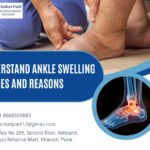Understanding Knee Swelling: Causes, Symptoms, and Best Knee Exercises for Recovery
Knee swelling is a common concern that affects people of all ages, whether due to injury, overuse, or underlying medical conditions. A swollen knee and pain can significantly affect daily activities, making it difficult to walk, climb stairs, or engage in sports. Understanding its root causes and learning the right exercises can help manage the discomfort and improve joint health effectively.
What Causes Knee Swelling?
Knee swelling, medically referred to as knee effusion, occurs when excess fluid builds up around the knee joint. This can result from multiple factors:
- Injury or Trauma: Sports injuries, falls, or accidents can damage ligaments, tendons, or cartilage, leading to swelling.
- Arthritis: Conditions like osteoarthritis or rheumatoid arthritis often trigger fluid accumulation in the knee joint.
- Overuse: Repetitive activities like running or jumping can strain the joint and lead to swelling.
- Infections: Bacterial infections in the knee joint or surrounding tissue can cause severe swelling and pain.
- Other Conditions: Gout, bursitis, or cyst formation around the knee can also contribute to the problem.
When knee swelling persists for more than a few days or is accompanied by intense pain, redness, or fever, consulting an orthopedic specialist is essential.
Signs That You Need Medical Attention
While mild swelling can often be managed at home, some signs indicate the need for professional treatment:
- Persistent swollen knee and pain even after rest
- Difficulty bearing weight or straightening the leg
- Sudden swelling after an injury
- Warmth or redness around the knee joint
Ignoring these warning signs can worsen the underlying condition, leading to long-term damage.
Simple Home Remedies to Reduce Knee Swelling
Mild knee swelling can sometimes be managed with simple home remedies:
- R.I.C.E Method: Rest, Ice, Compression, and Elevation help control swelling and discomfort.
- Over-the-Counter Medications: Nonsteroidal anti-inflammatory drugs (NSAIDs) can reduce pain and inflammation.
- Weight Management: Reducing body weight helps decrease pressure on the knee joint.
- Gentle Stretches: Light movements can improve blood flow and prevent stiffness.
Best Knee Exercises for Strength and Mobility
Regular knee exercises play a crucial role in recovery and prevention of future knee problems. Below are some recommended exercises:
- Quad Sets
- Sit on a flat surface and tighten your thigh muscles by pushing the back of your knee down.
- Hold for 5 seconds and repeat 10 times per leg.
- Helps strengthen quadriceps muscles without straining the knee.
- Straight Leg Raises
- Lie down and keep one leg bent and the other straight.
- Slowly lift the straight leg to the height of the bent knee.
- Repeat 10–15 times per leg to build strength.
- Heel Slides
- Lie flat on your back and gently slide your heel toward your buttocks.
- Hold for a few seconds, then return to the starting position.
- Improves flexibility and range of motion.
- Bridging
- Lie on your back with knees bent and feet flat on the floor.
- Lift your hips while tightening your core.
- Strengthens glutes, hamstrings, and stabilizes the knee joint.
- Wall Sits
- Lean your back against a wall and slide down into a seated position.
- Hold for 15–30 seconds, gradually increasing the time as strength improves.
Prevention Tips for Healthy Knees
- Warm-Up Before Exercise: Always stretch before engaging in sports or heavy activity.
- Wear Proper Footwear: Supportive shoes reduce stress on the knees.
- Strengthen Supporting Muscles: Strong thighs, hips, and core help take pressure off the knees.
- Maintain a Healthy Weight: Reduces strain on knee joints.
- Regular Checkups: Periodic visits to an orthopedic doctor ensure early detection of problems.
When Surgery Might Be Needed
If swelling persists despite medications, therapy, and lifestyle adjustments, surgical options like arthroscopy or knee replacement may be considered. Early diagnosis and treatment reduce the likelihood of invasive interventions.
About Dr. Aniket Patil – Expert in Knee Care, Kharadi, Pune
At Dr. Aniket Patil’s Orthopedic Clinic in Kharadi, Pune, we specialize in comprehensive orthopedic care, focusing on advanced diagnosis and treatment for conditions like knee swelling, swollen knee and pain, and post-injury rehabilitation. Our team provides customized knee exercises and recovery plans to ensure long-term joint health. Whether you’re seeking preventive care, injury treatment, or expert advice, we are here to help you regain mobility and confidence.
Tags-: knee swelling in kharadi, swollen knee and pain in kharadi, knee exercises in kharadi, knee swelling in Pune, swollen knee and pain in Pune, knee exercises in Pune
Frequently Asked Questions (FAQs)
Ans. The most common causes of knee swelling include injury, arthritis, overuse, and infection. Consulting an orthopedic doctor helps identify the exact cause and get proper treatment.
Ans. Mild swelling may reduce in 2–3 days with rest and home remedies, but severe swelling can take weeks and often requires medical attention.
Ans. Yes. Gentle exercises like quad sets, straight leg raises, and heel slides can strengthen muscles, reduce stiffness, and aid in recovery.
Ans. If swelling is sudden, accompanied by redness, warmth, or severe pain, or persists beyond a few days, seeing an orthopedic doctor is strongly advised.
Ans. Maintaining a healthy weight, strengthening leg muscles, wearing supportive shoes, and avoiding repetitive stress on the knee are effective preventive measures.

 Previous Post
Previous Post Next Post
Next Post